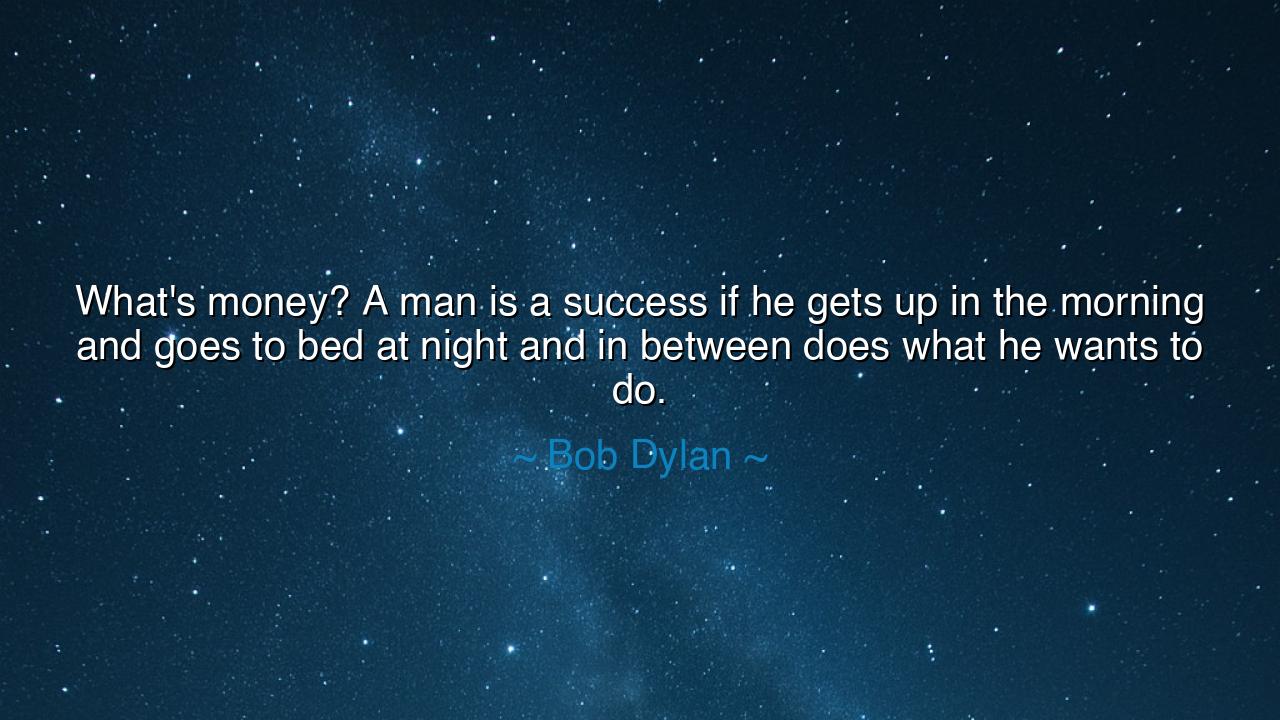
What's money? A man is a success if he gets up in the morning
What's money? A man is a success if he gets up in the morning and goes to bed at night and in between does what he wants to do.






Bob Dylan, poet of rebellion and prophet of song, once spoke with disarming simplicity: “What’s money? A man is a success if he gets up in the morning and goes to bed at night and in between does what he wants to do.” These words, spoken by one who turned his back on convention and carved his own path, are not a rejection of wealth alone but of false measures of greatness. They remind us that true fulfillment is not counted in coins or titles but in the freedom to live each day in harmony with one’s heart.
The question “What’s money?” is not meant to deny its practical necessity, but to strip it of its false glory. Many men chase riches only to find themselves enslaved by them. Dylan offers another measure: to rise in the morning not with dread, but with joy; to pass the day not in servitude, but in purpose; to close one’s eyes at night not in regret, but in peace. By this measure, the beggar with freedom of spirit may be richer than the king with chains of gold.
The mention of the morning is sacred. Morning is the beginning, the chance to choose, the symbol of renewal. If one can awaken each day with eagerness for the work ahead, then one has already conquered despair. And the night, with its rest, becomes not an escape but a gentle reward. Between these two bookends of the day lies the essence of life: to “do what one wants to do,” not in selfish indulgence, but in alignment with one’s deepest callings.
History bears witness to this truth. Consider Henry David Thoreau, who abandoned the bustling streets of society for the quiet woods of Walden Pond. He was poor in possessions but rich in freedom, and his writings still inspire generations. Or think of Vincent van Gogh, who lived in poverty and pain, yet painted with unrelenting devotion. Though ignored in his time, his life was the embodiment of Dylan’s creed: he rose each day to do what he believed he was meant to do, and in this he found a form of success deeper than wealth.
Yet Dylan’s words also carry a challenge. They ask us: are you living your days, or are you merely enduring them? If you rise each morning with dread, if your hours are spent in toil divorced from your heart, then no matter your wealth, you are poor. But if you awaken with joy, even if the world calls you ordinary, then you are already crowned with victory. The true poverty of man is not the lack of money but the absence of meaning.
The lesson is clear: set your success not by the measures of others, but by the rhythm of your own soul. Define your life by the work that brings you alive, by the callings that burn within you. Let your goals not be only survival, but joy. Then each day becomes a gift, each night a rest, and your life a song that no wealth could buy.
Practical action follows: seek the path that aligns with your spirit. If you are trapped in labor that deadens you, begin shaping steps toward freedom, however small. Cultivate passions that awaken your heart, even if they seem humble. Value time over treasure, integrity over acclaim, peace over possessions. For when your days are filled with purpose, you will have found the wealth Dylan spoke of — a life worth living.
Thus Bob Dylan’s words echo as a hymn of freedom: “What’s money? A man is a success if he gets up in the morning and goes to bed at night and in between does what he wants to do.” Children of tomorrow, remember this: do not measure your life in gold or applause. Measure it in mornings filled with desire, in days spent in true labor of the soul, and in nights closed with peace. This, and nothing else, is success.






AAdministratorAdministrator
Welcome, honored guests. Please leave a comment, we will respond soon